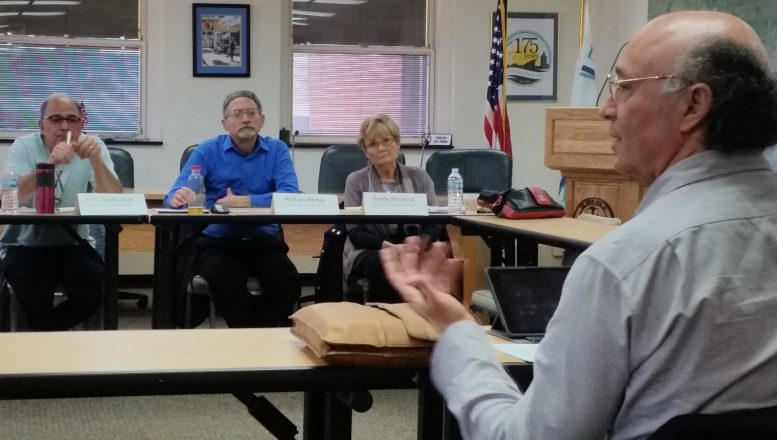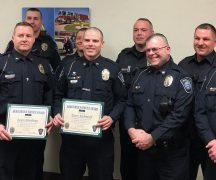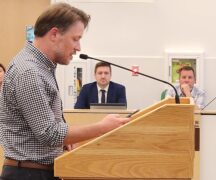By JAN LARSON McLAUGHLIN
BG Independent News
Bowling Green residents are hungry for food trucks in the city. And Phil Barone thinks he has a menu that might please their palates.
Barone, who has owned Rosie’s Italian Grille in Toledo for 36 years, has a food truck that serves customers in Perrysburg and Toledo.
“To be honest about it, I’ve been looking in Bowling Green,” said Barone, who is a BGSU alumnus. But Bowling Green’s food truck rules are too restrictive, he told city officials Saturday during a work session examining the city’s food truck ordinance. No food vendors are allowed on public property – unlike other communities where food trucks can set up in parking lots or in street parking spots.
The city of Toledo first balked at changing its ordinance, Barone said.
“I got a lot of flack. The restaurants didn’t like us there,” he said.
But the food trucks have transformed St. Clair Street every Tuesday and Thursday afternoon during lunch time. Now instead of just a handful of people venturing out to eat on St. Clair, the food trucks draw about 1,500 during lunchtime.
“People come out like ants. It’s fun to watch,” Barone said.
Barone heads up a food truck association which has 11 members. Their menus offer items like grilled baby lamb chops, lobster mac and cheese, cauliflower crust pizza, Cuban food, steamed mussel salad, perch, cappuccino, and ice cream.
“Food trucks aren’t just serving corn dogs,” Barone said.
The committee examining Bowling Green’s food truck rules – made up of council members Bill Herald, Sandy Rowland and John Zanfardino – has heard from citizens wanting food truck options, from local business owners concerned about the impact on their livelihoods, and from prospective food truck owners who would like to set up their mobile shops here.
“I’m hearing from a lot of people,” Rowland said. “The citizens say ‘Yes, we want them.’”
Some downtown businesses also would like to see food trucks. “We need interesting things to bring people downtown,” Rowland said they have expressed to her.
But brick and mortar restaurants, and the Downtown BG organization have voiced concerns about the mobile vendors taking business from existing restaurants and creating litter problems.
So the committee has been looking for common ground. “I firmly believe there is an intersection,” where all can co-exist, Herald said.
Barone may have given them that common ground on Saturday.
Food truck operations are serious businesses, that want to offer citizens dining options and want to be part of the community, he said. They are sometimes accused by other businesses of “cherry-picking,” but that is not true, Barone said.
“We don’t want to just pull in and not be part of what you’re doing,” he said. “They are your future restaurateurs. It’s a smart way to see if your food is going to work.”
Food trucks are not fleeting businesses, with Barone spending $135,000 on his food truck.
“I knew there was a niche. If you have a good product, you can do it,” he said.
The food truck owners must have insurance, food licenses, generators that don’t make too much noise, and Facebook followings. Those in Barone’s association set up during special events, like weekly farmers markets or car shows – and pay fees to do so.
They serve a niche of feeding people who are in a hurry, want variety in menus, and want to pay less.
Five trucks in his association set up weekly for the Perrysburg farmers market.
“The restaurants are still packed,” he said of the downtown Perrysburg brick and mortar sites.
The association is in the process of also setting up regular schedules in Waterville and Maumee.
“They help cities grow. I think Bowling Green should be next,” Barone said. “Why should Bowling Green people have to go to Perrysburg?”
Barone said downtown businesses could actually benefit because the food trucks will bring new foot traffic. They can peacefully co-exist.
“They are coming down for the food trucks, and they see stores they didn’t see before,” he said.
“Why can’t it happen here,” he said. “I love this place. Bowling Green’s always had a good feel. It’s a cool town. If they have a reason to come here, they will.”
Food trucks can raise the bar for food options in the community, Barone said.
“People get bored” with static menus at restaurants, he said. “People let you know what they like and don’t like. People are going to go where the best food is. Competition is a good thing.”
And food trucks can bring new life to existing events like the weekly downtown farmers market. Add in music, and the events become magnets, he said.
“I call it the ‘wow’ factor, that people need to come out,” Barone said. “If you add food trucks to that, and music, it would be huge. It will be jammin’.”
Families are drawn to food trucks and music, he said. “It’s like America. It feels good.”
Bowling Green resident David Pfleger said in his travels he has seen the food truck phenomena.
“I’ve found that the food trucks are an excellent draw for families,” he said. And the existing restaurant benefit from that attraction. “They are a positive. They are a good pull.”
Pfleger, the only Bowling Green resident to attend Saturday’s meeting, urged the city to make it possible for food trucks to operate here.
“I encourage you guys to allow this,” he said, adding that he frequently travels to other cities for dining variety. “We go to restaurants outside Bowling Green. It’s not bad, but it’s the same. It doesn’t change.”
Council member Bruce Jeffers asked if the food trucks in Toledo have put anyone out of business.
“I don’t know of one,” Barone said. “We’ve done more good than harm by far in downtown Toledo.”
“Some people thought it was doom and gloom, and we were the devil,” he said. “Food trucks are not going to make a restaurant go out of business. They may make them change things.”
Rowland agreed.
“I think we’re making that into a boogeyman, that isn’t as scary as it sounds,” she said. “This is what we need to hear.”
The committee had discussed restrictions that could be imposed on food trucks, such as days they would be permitted, hours of operation, licensing, income tax collection, litter handling, seating areas and size of trailers.
Barone suggested the fewer restrictions, the better. Food truck operators won’t set up in residential neighbors, and they won’t operate late into the night. They will only set up when there is business. Perrysburg and Toledo allow food trucks anytime, but the vendors only set up in the warmer months, one day a week in Perrysburg, and two days a week in Toledo.
“If you put restrictions in, you won’t get food trucks,” he said. “They have a right to do business.”
Food truck owners are also careful to not get in the way of brick and mortar sites. They won’t park in front of restaurants, he said.
“It’s kind of a sticky thing. That’s just bad business. We have a code,” Barone said. “You cut the pie. You figure out what your niche is. You don’t hurt other businesses.”
As for litter, food truck association members follow the camping code, he said. “You leave the place better than you found it.”
Food trucks are allowed at the University of Toledo, and Barone said he may soon be approaching Bowling Green State University.
“I think it’s a natural,” he said.
The next food truck committee meeting will be announced at Monday’s City Council meeting.





